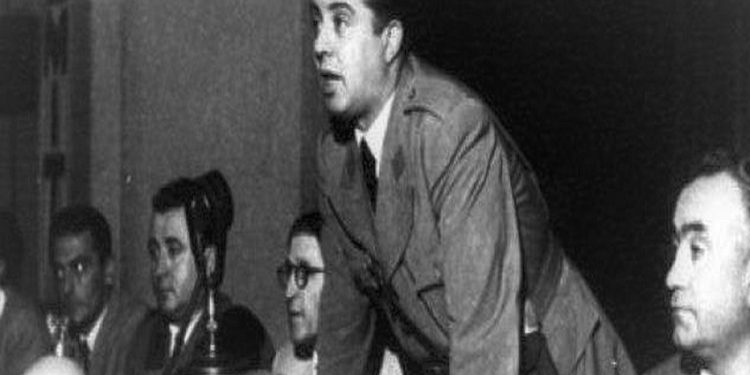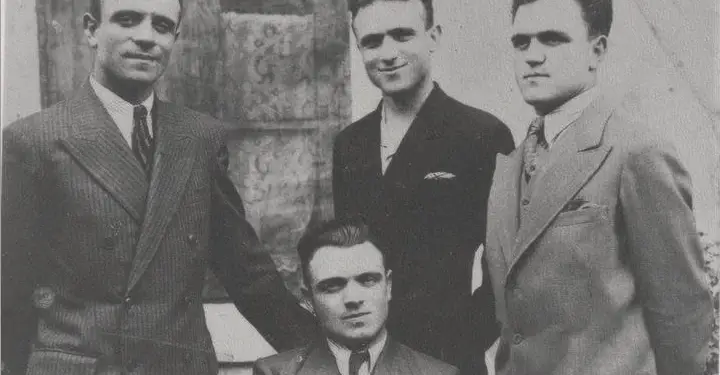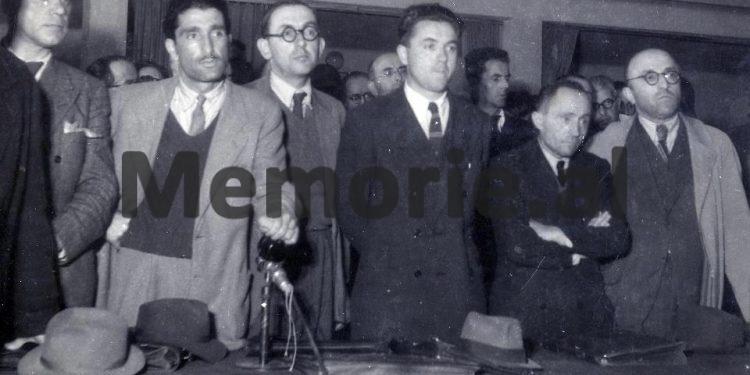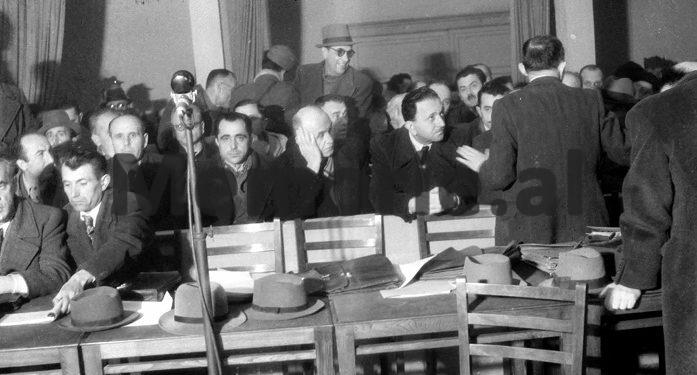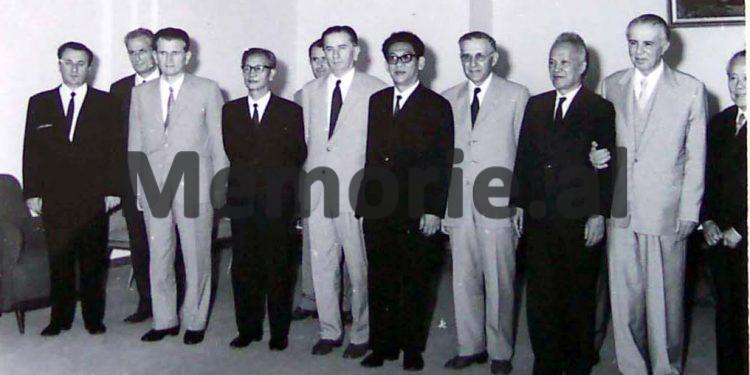Memorie.al publishes an archival document issued from the fund of the former Central Committee of the ALP which deals with the discussion of Enver Hoxha held at the meeting of the Political Bureau of the Central Committee of the Albanian Labor Party on September 6, 1966, where the supremacy of the Ministry of Justice was discussed and decided, which had been established since the end of 1944 with the coming of the communists to power. What is further said in the report kept by Enver Hoxha regarding that problem, who were the lawyers he mentioned as the worst example and how did he argue the superiority of the Ministry of Justice?!
“Who does the lawyer protect from us?” In essence, it is provided for us that the people’s justice protects the interests of the people, without forgetting the interests of the one who is being tried. When this is the case, why leave us lawyers such as Suat Asllani or Koço Dilo who, contrary to the evidence, the law, the interests of the Party and the people, call to court that the thief is “honest”, that the murderer is innocent ” What does justice need such people? In the West it is different, the lawyer there defends people who are politically and economically oppressed by the bourgeois power.Everyone knows that the Party solves issues, even much more important and delicate problems, without Then, while in our courts we have the organization and people of the Party, determined and conscientious, just and objective in administering popular justice, why is it necessary to have lawyers? The latter a criminal, for example, even when his guilt is proven fourfold, they try to acquit him.Then they do not act right.When it is the case to take into account the mitigating circumstances in an act committed, or when the evidence is not sufficient to prove guilt, this is done by our own popular court, our people of justice, who, judging the matter with a partisan spirit and a clear conscience, may decide to give a lighter sentence to a man or declare him innocent it when the evidence is not convincing. Then why should we hear in our courts the voice of lawyers, including those I mentioned? This is what Enver Hoxha said, among other things, at the meeting of the Political Bureau of the Central Committee of the ALP, held on September 6, 1966, when he had decided to close and abolish the Ministry of Justice, which had been established since the end. of 1944, when the Communists had just come to power. What is further stated in the report held by Enver Hoxha regarding that problem, who were the lawyers he cited as the worst example and how he argued the superiority of the Ministry of Justice. This is what this archival document that Memorie.al is publishing is about.
Discussion of Enver Hoxha at the meeting of the Political Bureau of the Central Committee of the ALP
THE ACTIVITY OF OUR COURTS DEPENDS ON THE PARTY AND THE PEOPLE
September 6, 1966
We are discussing today the question of whether the Ministry of Justice should no longer exist. As a socialist country in dynamism, based on the principles of Marxism-Leninism and the experience we have gained, for the Ministry of Justice we have today reached some conclusions that we consider fair, based on which we will have to act. relevant. Based on the competencies that this ministry has and the tasks it performs in our socialist order, we judge whether we should keep this department or not. And whether it should be suppressed or maintained, this should be well argued. If we decide to abolish this department, it does not mean that we reject the past, that is, its positive side.
We have the Constitution and the administration of justice in our country based on fair principles. If it is accepted that the Supreme Court can make decisions, but no one else can intervene in its judicial activity, because only the Ministry of Justice can lead the judiciary, then it turns out that this ministry, which is an integral part of the Government, should to have competencies in this regard. Such a layout of the problem, I think, attacks our legislation, attacks the laws and even the principles of the Constitution. The Ministry of Justice, during its existence, of course, has played its positive role and this is not because it has been headed by one or the other, but because our popular justice bodies have implemented the straight line of the Party and the aspirations of the people, who are synthesized and make it up, because, like any sector of state activity, the judiciary has always been led by the Party.
The Ministry of Justice had the right to conduct inspections and draw conclusions about the activity of the courts when it saw that this or that work was not going well. In such a case she had the duty to suggest to the President of the High Court with facts, that the law in this or that case, in this or that decision taken by the court was not applied correctly. But again, only the president of the Supreme Court would decide whether to overturn or uphold the decision that attacked the ministry. According to the instructions of the Central Committee of the Party, all the doors have been and are open for any person or state and social body to go to the Party to complain, raise problems, give opinions on the work of various cadres and institutions.
The Ministry of Justice has also had this right for the courts and its work has yielded positive results for some time. So, not only the Ministry of Justice, but also every other state body, the Party and the Government advise to look carefully at how this or that law has been implemented, why the socialist property has been damaged, for example, in Sharrat e Puka, how the courts have stood. to this case etc., etc. If it is thought that the Ministry of Justice was abolished and the dictatorship of the proletariat was weakened, this means that it is not understood what are the functions of one and the other body in the system of the dictatorship of the proletariat.
The Ministry of Justice is not the headquarters of the dictatorship of the proletariat. This headquarters consists of the Party, the Congress and its Central Committee. These have given instructions to the Politburo, the Government, the Presidium of the People’s Assembly, the Supreme Court, the Ministry of Justice, etc., to act according to them. So, the leading head of the dictatorship of the proletariat in our country is the Party Congress and the Central Committee elected by it, therefore there is no need to weaken any link of this dictatorship if we abolish a state administration body such as the Ministry of Justice. To think that the basic courts and the Supreme Court are independent of anyone and to say, on the other hand, that they should be subordinate to the Ministry of Justice is to deny the leadership of the Presidium of the People’s Assembly over the Court of Justice. High and, somewhat worse, to deny the role of the Party to guide the correction of decisions taken by the court, when they are not fair, to deny, therefore, the role of the Party and the Presidium of the People’s Assembly in running the justice sector.
How should we understand the competencies of the Politburo, the Presidium and the People’s Assembly? In the event that the Politburo would receive, for example, a report on errors in the work of the Supreme Court, it would request that the matter be raised in a state way, since we have a state and are based on laws. Therefore, in such a case, the Politburo, after examining the issue, charges those members of it, who are also members of the Presidium of the People’s Assembly, that, when they come to a meeting of the Presidium, after having previously spoken about the decision of the Politburo with the chairman of the Presidium, who is also a member of the Central Committee, on behalf of the Bureau, to raise the issue in the Presidium, where the relevant decision is made for the work of the court, it is the Presidium of the People’s Assembly that has the right to convene the leaders of the High Court in the report and hold them accountable for their work, for cases where they have violated the laws, etc.
The Presidium also has the right, if it deems it appropriate, to convene a meeting of the People’s Assembly, to report to it that the Supreme Court has violated the laws, has thus violated the interests of the state of the dictatorship of the proletariat and, depending on the degree of error, has the right to propose to the Assembly that appropriate measures be taken. The decision is then taken by the People’s Assembly. In the spirit of the Party and the Constitution, of the laws of popular socialist power, and drawing on the teachings of Lenin and the experience of the Soviet Union under Stalin, these bodies, namely the basic courts and the Supreme Court, have the law given competencies, which they have the right and are obliged to implement. We have sanctioned in the Constitution and this is the right of the courts to be independent in the decisions they take to adjudicate concrete cases.
But it is known that the Supreme Court is elected by the People’s Assembly, just as its other bodies are elected. Even the grassroots courts were not elected by the Ministry of Justice, but by the people, so it cannot be said that the courts are independent and irresponsible even by those who elect them. None of us is independent before the Party and the people. The Constitution has correctly resolved the relationship between the elected and the electorate. Without the care of the Party, the courts can easily become repressive bodies against the people. It is known how the laws are made in our country, which the judicial bodies are obliged to implement. The actions of the courts cannot be interfered with unjustly, but the principle of the independence of the courts must be properly understood. Even these bodies are always and should be under the control and direction of the Albanian Labor Party and are inspired by it.
This means that our courts are under the control of the laws of the state and the Party, therefore their activity does not depend on the Ministry of Justice, does not depend on any other body, but on the whole Party and the people. We say the line of measures above all, the opinion elaborated by the Party above all. Court decisions are no exception to these principles. If what the Party says would not be properly understood and acted upon in practice, then the principle of the line of measures would remain only a dry, worthless expression. The district and grassroots courts are not independent of the Party line. The judge, when he deems it necessary, can and should be summoned by the party secretary, or the chairman of the district executive committee, and they should explain to him, for example, the situation that an event has created in the Party and in the people of the district. bitter criminal that may have occurred and what is the opinion of the Party and the people about this event.
It can never be thought that our courts, the people of the people and the Party are not influenced by public opinion, by the opinion of the Party, that they do not live outside society. While the judge agrees that the voice of a witness be heard in our courts, and this is mandatory by law, then somewhat more these bodies are obliged to hear, in the first place, the voice of the whole mass and, above all, the voice of the Party. It is on the basis of this sound opinion that the judge can and must decide correctly and in a revolutionary way. This means that the judge listens to what the measures mean and at the same time considers the laws, which are generally fair, and which in our country do not protect interests other than those of the working masses. It is not excluded that any law may not be complete, but the judge must prove this shortcoming precisely with the opinion of the Party and the masses.
A judge with high partisanship, after listening carefully to the opinion of the masses and the Party, would always decide in accordance with the spirit of the Party and the interests of the people, even if the law may have a gap. He would then immediately go to the Party to report on the decision he took, but at the same time he would point out some inaccuracies he sees in the law, for which he makes suggestions on how to correct them, he would even address the Presidium for this purpose. of the People’s Assembly, as well as the Government, to make the necessary correction and would argue his views to these higher instances. This is the first decisive control of the measures that cannot be replaced by the Ministry of Justice, even if it had greater powers, neither the Supreme Court, nor the Presidium of the People’s Assembly, nor even the Central Committee of the Party.
When an action punishable by law is committed, the courts have no way of giving a fair trial of the degree of guilt without considering the case. When the need arises, they ask the Party, ask for its help and it gives their opinion on this issue. Even the Supreme Court, while having the right to review the appeal in the second instance, cannot be deprived of the right to go to the base to control, assist, orient and inspire the courts along the Party line. If the Supreme Court has not done so far, I think it has left out the tasks entrusted to it. Decisions taken by district courts, in addition to being controlled by the Supreme Court, are also under the control of the Presidium of the People’s Assembly, which has the right to pardon a convicted prisoner, to pardon the life of a death row inmate, and so on., and in principle this is right.
The Party Congress, the Central Committee, the People’s Assembly and the Constitution have given this great right to the Presidium of the People’s Assembly.
There is the opinion of the Party and the government on the activity of the courts. Requests have been made, even decrees have been changed by the Presidium of the People’s Assembly when they had to do with the activity of the courts, mistakes may have been made, but in general it is positive that the issues have not remained unresolved. Many of them have been resolved by the Party and the Government without going to the Presidium of the People’s Assembly at all. Then the courts themselves were reasonable. They, acting as revolutionary bodies, have not allowed these issues to be resolved in violation of the laws, the Constitution. But, without violating the competencies, many issues have been resolved not only by the courts, through consultations with each other, but also by the Presidium of the People’s Assembly, where we are also members elected by the People’s Party and where collegial decisions are made. If, from a study conducted by the Party, it turns out that a criminal, a thief or harmer of socialist property, etc., is not hit to the proper extent, then we come to the Presidium of the People’s Assembly and ask the judiciary why these things are happening, why the courts are being lenient, etc. The Presidium of the People’s Assembly then provides guidance to the judiciary.
Of course, the Presidium needs to do the job better. To this end we need to provide some other staff to properly exercise the powers given to them. But these powers should not be such as to suffocate the courts, just as the powers of the Central Committee or the Government should not suffocate the Party committees and the executive committees of the district district councils, respectively. Therefore, the Presidium of the People’s Assembly must be careful to preserve the essence of the laws and the Constitution based on the method of control and verification. The Government also has the right to control. Po si? When we say Government, we do not mean only the Ministry of Justice, but all members of the Council of Ministers and, in the first place, the Prime Minister. Within the laws and according to the Party line, when the Government finds that judges make concessions, it should not and cannot remain indifferent, it is acting with all the powers given to the Party, not only as an institution as a whole, but also through any its member, separately. She is assisted for this purpose by all employees, starting with the investigator. But that is not enough. The government that has its eye everywhere, can see that in this or that case the plan is not being implemented, that in this or that sector there are these shortcomings or abuses, therefore it raises these, makes them problems.
When a member of the Government finds, for example, that some tasks are not performed, perhaps because the work of the Party is not going well, that here and there there are negative phenomena that become obstacles, he refers the matter to the Government, which examines the problem. and proposes measures to be taken in this regard as well. This work is being done day and night by both the Government and its members and I think they are doing very well. Thus, they respect the line of the Party and do not go beyond certain forms, yet who has prevented, for example, members of the Government from coming to speak even socially to the comrades of justice? The Prime Minister can also reprimand the heads of the judiciary at meetings of the Government, when any decision taken by them is not grounded. The government also deals with the courts in other ways.
For example, when the investigator finds that the court easily convicts a culprit, for example with five months of imprisonment, when he should be sentenced more, then this remark, through its department, is notified to the Government, which notifies the relevant superior bodies, that some court is not working well. Here, then, is a form of Government control over the courts. If he receives the same report again on an analogous case, then the Chairman of the Council of Ministers may address both the Politburo and the Presidium of the People’s Assembly, to which he gives his opinion directly on these cases. It is true that we have not studied law, but we have 25 years to deal with the implementation of the right policy of the Party, we also approve laws, therefore the 25-year school of the Party, which we have done, cannot be compared even with some law faculties.
The connection of the activity of the judiciary with the Government, with the highest executive and ordering body, does not depend only on a formality that is in conformity with the principle we have established in the implementation and control of our justice. The independence of the courts does not mean independence from the people and the Party, so it does not make anyone turn a blind eye to the proper implementation of the laws by those in charge of this work. District courts depend on the Supreme Court, so it has the right to review any of their decisions. Having the right to review the recourse, she has the right to get into even the most detailed court cases. If the Supreme Court needs some staff to exercise this right, then let us give them one. As far as advocacy is concerned, I have long been of the opinion that this institute should be abolished.
Who does the lawyer protect from us? In essence, it is provided for us that the people’s justice protects the interests of the people, without forgetting the interests of the one who is being tried. When this is the case, why should we leave lawyers such as Suat Asllani or Koço Dilo who, contrary to the evidence, the law, the interests of the Party and the people, call to court that the thief is “honest”, that the murderer is innocent »!? What does justice need such people? In the West it is different, the lawyer there defends people who are politically and economically oppressed by the bourgeois power. Everyone knows that the Party solves issues, even much more important and delicate problems, without a lawyer. Then, while in our courts we have the organization and people of the Party, determined and conscientious, just and objective in administering popular justice, why is it necessary to have lawyers?
The latter try to acquit a criminal, for example, even when his guilt is proven fourfold. So, do not act right. When it is the case to consider mitigating circumstances in an act committed, or when the evidence is not sufficient to prove guilt, this is done by our own popular court, our people of justice, who, judging the matter by spirit party and with a clear conscience, may decide to give a lighter sentence to a man or plead not guilty when the evidence is not convincing. Then why should we hear in our courts the voice of lawyers, including those I mentioned? In bourgeois countries, for example, in France, laws constitute a great forest. The Napoleonic Code is in force there, but there are still many other laws drafted centuries ago, from those of the 16th and 17th centuries. The defendant in France has no way of knowing how to get out of this dense forest of these laws, to be able to defend himself and escape from the charge.
How different is the situation in our country! We fight, first, for the laws to be as simple as possible. For their knowledge, to understand the essence by all people becomes great propaganda. We also make efforts for the political and ideological rise of the masses. In addition to all this, the Party recommends to the court to implement this or that law in a revolutionary way, that is, with full justice in the interest of the people. All these advantages do not exist in bourgeois regimes, where the institute of advocacy is justified. However, we can also study this issue, but it is logical to judge in this way. With the abolition of the institute of advocacy, as an institute of professional defense, we do not in any way violate the principle of the right to defense that the Constitution recognizes to the defendant. Everyone has the right to a fair trial. As it turned out from the discussions, we all agree that the Ministry of Justice should be abolished, we just need to think about what organization we will create within the High Court./Memorie.al





